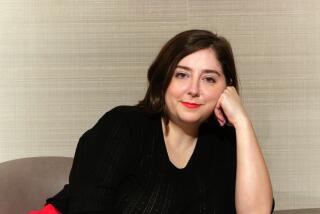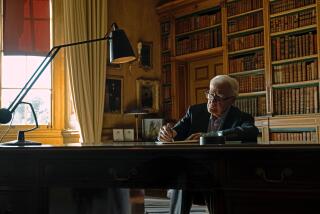Review: Errol Morrisâ âMy Psychedelic Love Storyâ is a little too trippy for its own good
Over one of the more illustrious careers in documentary film, Academy Award winner Errol Morris has played interrogator (âThe Fog of Warâ), detective (âThe Thin Blue Lineâ) and/or biographer (âA Brief History of Timeâ), always some variation on the cool obsessive, pulling viewers into a melange of truth and unreality that usually leaves as many questions as it does answers.
But of late, Morris has allowed a less detached, warmer side to surface in between his more clinical filmic inquisitions. In 2016 we got his gentle, admiring portrait of photographer/friend Elsa Dorfman (âThe B-Sideâ), and now the frisky, friendly (if not always compelling) âMy Psychedelic Love Story.â His subject/star is Swiss-born author Joanna Harcourt-Smith and her globe-trotting â70s affair with counterculture guru Timothy Leary, which started when the Harvard psychologist was a U.S. fugitive hiding in Europe and she was a flower-child adventuress, and ended having forever altered both livesâ trajectories.
As sole interviewee for Morrisâ camera this time, Harcourt-Smith â who died in October â proves a mostly engaging raconteur about the acid-colored, romantic bond that she claims the oft-married Leary declared a âperfect love,â albeit one that lasted only five years, a handful of which when he was back in prison in California. Winding up an inmateâs girlfriend angling for his release was a far cry from growing up a Parisian heiress who cavorted with cultural legends and socialites, but in Harcourt-Smithâs telling, you stick by your soulmate, maybe even more so when heâs considered the most dangerous American on earth.
Though sheâs long been thought of by his adherents as a CIA-planted agent provocateur aimed at turning Leary into an informant â a persona she grew to laugh about, and Morris gooses by interspersing clips of Greta Garbo from âMata Hariâ â Harcourt-Smithâs own version of those glamorous, outlaw-passion years, upon her reflection, and makes room for the possibility that there might have been some grand, hidden manipulation going on with regards to Leary, to which even she was unaware. She was motivated to reach out to Morris, in fact, after seeing the filmmakerâs speculative doc/narrative hybrid âWormwood,â which dug into the CIAâs secret mind control experiments with LSD.
But also, one imagines Harcourt-Smith simply liked the notion of unpacking her glittering, mysterious tales â of childhood hellishness under a cold, war-traumatized Jewish mother, shady companions, jet-setting, altered states and ulterior motives â all over again for an audience. (In 2013 she published the memoir âTripping the Bardo With Timothy Leary: My Psychedelic Love Story.â) And Morris, clearly smitten with this elegant free spiritâs candid storytelling skills and rich, name-dropping details (hanging with the Rolling Stones, crashing with Diane von Furstenberg, helicoptering with Francis Coppola), is happy to oblige.
A little too happy, maybe. Though we could always use more biodocs that take the ignored or forgotten femaleâs view toward some Important Man of History â and Leary seems an overrated icon of his era â Harcourt-Smithâs narrative is at times a rambling one, with rehearsed flourishes that donât always land as they should.
Morris may even grasp this a little, since he augments Harcourt-Smithâs one-woman monologue with a relentless, kaleidoscopic array of film snippets, photographs, pop art iconography and title fonts that, while generally fun (the repeated acid tab sheet design is a nice touch), eventually wears thin as a complementary trippy design scheme. Sometimes itâs simply too literal â if she mentions something looked like eyes, do we need a hallucinatory archival clip of multiple eyes?
If anything, the second-half machinations in âMy Psychedelic Love Storyâ surrounding Leary as a compromised high priest under the Nixon administrationâs thumb becomes something of an albatross, more what we expect from Morris instead of whatâs inherently compelling. Especially since Harcourt-Smithâs overall journey is interesting enough to make one wish for a more shaped, less freewheeling portrait, one that filled in the before and after of a peripatetic, swept-away life, which didnât need the prism of a more famous lover.
'My Psychedelic Love Story'
Not rated
Running time: 1 hour, 41 minutes
Playing: 9 p.m., Nov. 29, Showtime; also available on Showtime Anytime
More to Read
Only good movies
Get the Indie Focus newsletter, Mark Olsen's weekly guide to the world of cinema.
You may occasionally receive promotional content from the Los Angeles Times.










